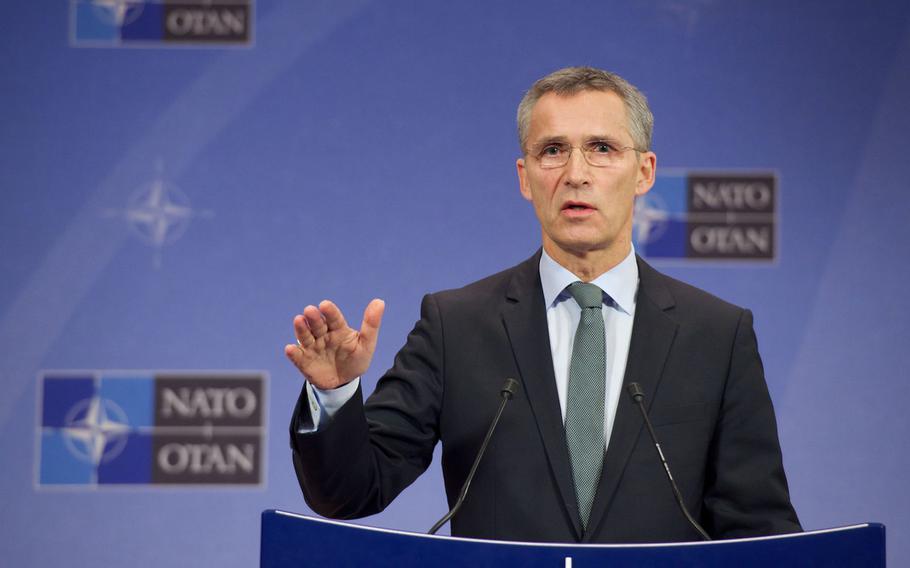
NATO Secretary General Jens Stoltenberg speaks at a news conference on Monday, Dec. 1, 2014, a day before a NATO foreign ministers meeting at NATO headquarters in Brussels, Belgium. (NATO)
KAISERSLAUTERN, Germany — NATO’s civilian leader said Monday that the alliance would not give Russia any guarantees that it wouldn’t allow former Soviet allies to join its ranks, asserting that no country outside NATO had a “veto” over membership.
But the alliance will also not provide weapons to Ukraine’s pro-Europe government to help it battle pro-Moscow separatists.
Speaking to reporters ahead of a meeting of the alliance’s foreign ministers, NATO Secretary-General Jens Stoltenberg said Russia and so-called Islamic State militants were both responsible for “uncertainty” creeping toward the alliance’s borders.
If Georgia or Ukraine were to apply for membership to NATO, Stoltenberg said, “then we go into the normal processes” of determining whether a prospective member fulfills the standards and adheres to the principles required for membership. That process can take years.
“But this is a relationship between NATO and the country that applies,” Stoltenberg said. “And no third country outside NATO can veto the enlargement of NATO.”
As for supporting Ukraine’s government against Russia and separatists, he indicated that NATO won’t provide the kind of direct military support Kiev has asked for and won’t serve as a venue for developing plans or commitments to provide weapons to Kiev.
NATO’s top diplomats will meet Tuesday to solidify plans for a continuous troop presence in the alliance’s east, where U.S. forces deployed on a continuous rotational basis in April to quell the nerves of allies anxious about Russia’s illegal annexation of Ukraine’s Crimea peninsula.
Stoltenberg’s remarks came a day after Russia sent another convoy of what it called “humanitarian” aid into eastern Ukraine, where a tenuous cease-fire between Moscow-backed separatists and Ukrainian forces has been repeatedly violated during a months-long civil war.
Russia has backed moves by the separatists to split from Ukraine, recognizing results of an election held by rebels last month in violation of the cease-fire agreement. NATO has accused Russia of supporting the rebels with high-tech weaponry, materiel and reinforcements from its own ranks, which Moscow denies.
“While efforts for lasting peace continue, we see a significant military buildup in and around Ukraine,” Stoltenberg said. “Large transfers of Russian advanced weapons, equipment and military personnel to violent separatists. And a major increase in Russian military activity around Europe and beyond.”
Russian President Vladimir Putin further inflamed tensions in Europe last week when he signed a security treaty with leaders of Abkhazia, a breakaway province of Georgia in which Russia has had troops for more than two decades.
These moves have prompted the newly elected leadership of Ukraine to raise the possibility of joining NATO, a move that Moscow opposes. Dmitri Peskov, a top adviser to Putin, said last month that the Kremlin wants “a 100 percent guarantee” that Ukraine will be prevented from joining the alliance.
Providing such a guarantee, Stoltenberg said, is “against the fundamental principles on which we are basing our security.”
NATO will launch trust funds to assist Ukraine in developing its defense capabilities on Tuesday, Stoltenberg said, but when it comes to providing equipment, “I think it’s right only to leave that to each ally to decide in a bilateral agreement with Ukraine.”
NATO’s Tuesday meeting is also expected to formulate an interim solution for a new NATO quick-reaction force, as well as a plan for support for Ukraine and the launch of the alliance’s post-2014 mission in Afghanistan. The readiness of Afghan security forces has come under increased scrutiny in the wake of numerous high-profile attacks.
NATO’s post-2014 mission has been slower to materialize than the U.S.’s own follow-on mission, which will include nearly 10,000 troops. American officials have indicated that the U.S. might commit up to 1,000 more troops to help with the NATO mission, which has fallen short of its manning targets, jeopardizing its postwar plans.
NATO’s headquarters will also host a meeting later in the week on U.S.-led efforts to combat Islamic State militants in Iraq and Syria, but NATO is not part of that coalition, Stoltenberg said. “There has been no request” for NATO to take a military role against Islamic State fighters, he said.
millham.matthew@stripes.com Twitter: @mattmillham